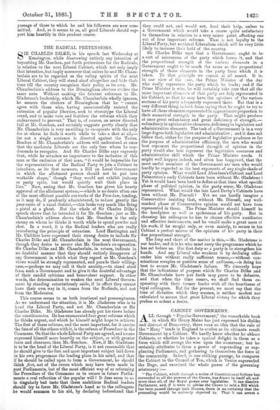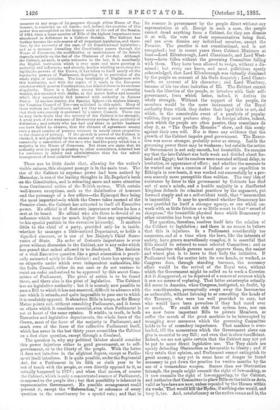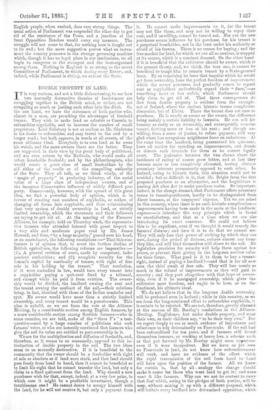CABINET GOVERNMENT.
ALL through Popular Government," the remarkable book in which Sir Henry Maine has just expressed his dislike and distrust of Democracy, there runs an idea that the rule of the "Many" tends in England to evolve as its ultimate result Government by a Cabinet. We hardly know whether he abhors Cabinets, or whether he takes a cynical delight in them as a force which will avenge the wise upon the numerous ; but he certainly attributes to them a power of superseding or sup- planting Parliament, and gathering to themselves the force of the community. Indeed, in one striking passage, he compares the Cabinet to the Council of Ten, which in Venice superseded the Doge, and exercised the whole power of the governing
aristocracy :—
" The Cabinet, which through a series of Constitutional fictions has succeeded to all the powers of the Crown, has drawn to itself all, and more than all, of the Royal power over legislation. It can dissolve Parliament, and, if it were to advise the Crown to veto a Bill which has been passed through both Houses, there is no certainty that the proceeding would be seriondy objected to. That it can arrest a measure at any stage of its-progress through either House of Par- liament, is conceded on all hands ; and, indeed, the exercise of this power was exemplified on the largest scale at the end of the Session of 1884, when a large number of Bills of the highest importance were abandoned in deference to a Cabinet decision. The Cabinet has further become the sole source of all important legislation, and there- fore, by the necessity of the case, of all Constitutional legislation ; and as a measure amending the Constitution passes through the House of Commons, the modification or maintenance of its details depends entirely on the fiat of the Ministers of the day. Although the Cabinet, as Finch, is quite unknown to the law, it is manifestly the English institution which is ever more and more growing in authority and influence; and already, besides wielding more than the legislative powers of the Crown, it has taken to itself nearly all the legislative powers of Parliament, depriving it in particular of the whole right of initiation. The long familiarity of Englishmen with this institution, and with the copies of it made in the European countries which possess Constitutions, has blinded them to its extreme singularity. There is a fashion among historians of expressing wonder, noturnmixed with dislike, at the secret bodies and councils which they occasionally find invested with authority in famous States. In ancient history, the Spartan Ephors—in modern history, the Venetian Council of Ten—are criticised in ,this spirit. Many of thesewriters are Englishmen, and yet they seem quite uneonscions that their own country is governed by a secret Council. There can be very little doubt that the secrecy of the Cabinet is its strength. A great part of the weakness of Democracy springs- frour publicity, of discussion ; and nobody who. has.-liad any. share in public business eamhave failed to observe, that the chances of agreement among even a small nutnber-of parsons increase in nearly exact proportion to the chances of privacy. If the growth in power of the Cabinet is nhecked, it will probably -be from ceases of -very -recent origin. It is essentially a committee of the men who leadithe party whichilaas a majority in tha House of Commons. But .there are signs that its authority over its party ispaseing to other committeea, selected less for eminence in debate and administration than for the adroit management of local political business."
There ean be little doubt that, allowing for the writer's visible animus, this eloquent passage is in the main true. The rise of the Cabinet. to supreme power had been noticed by Macaulay, is nne of the leading thoughts in Mr-Bagehot's book 'on-the Constitution, and is attracting more and more attention from Oontinental critics of the British system. With certain well-known exceptions, such as the distribution .of. honours and the patronage of a few ‘offices—the Episcopal Sees being the most important—in which the 'Drown takes conned of the Premier alone, the Cabinet has attracted to itself all Exenutive power. No Official is of first-rate -importance unless:holes a -seat at its .board. No official who sits there is devoid of an infinenee which tnay-he much higher than:any appertaining to dais special positiondn the executive. hierarchy. It matters 'little to. the chief of a party, provided only he is inside, -.whether. he manages a little-noticed Department, or holds a dignified sinecure, or is one of her .Majesty's Chief Secre- taries .of State. No order of first-rate importance is 'ever giren without discussion-in- the Cabinet, nor is any order-which laas.passed that-ordeal. allowed to be disobeyed. The decision of a vital Executive question like a great annexation is practi- -cally entrusted solely to the Cabinet ; and there has sprung up an etiquette under which even independent :authorities, like the India Council, either do not care or do not venture to -resist an order understood to be-approved by.this secret Com- mittee of Parliament. The pivot of action is to be found there, and there also is the pivot of legislation. The-Cabinet than no legislative authority ; but it is scarcely now possible to pass a.Bill to which it has notassentedi difficult to advance with .one which it retards, and quite impossible to pass one to which ibis nesolutely.opposed. Itabandons Bills in heaps, as Sir Henry Maine points out, without consulting Parlierrientvand it forces on others which it considers essential, even when Parliament is not at heart of the same vpinion. It.wields, in truth, in both Executive and legislative departments, the whole force of the Grown, most of the force of the majority in Parliament,and much even of the force of the collective Parliament itself, which has never in the last thirty years overridden the Cabinet on a first class question, except through a dismissal. The question is, why any political thinker should consider this power injurious either to good government, or. to self- government, or to the liberty of the people. • With the latter it does not intetfere in the slightest degree, except as Parlia- ment itself interferes. Ibis quite possible, underthe Septennial 'Act, for a 'Parliament in its fifth or sixth year to be .out of touch with the people, or even direetly opposed to it, as actually happened in 1879; and when that occurs, of course the Cabinet, which is only a concentrated essence of Parliament, .is opposed to the people also ; but that possibility is inherent in Tepresentative Government. No possible arrangement could -prevent it, except .the “Referendum," or reference of -every question to the constituency for a special vote ; and that in its essence is government by the people direct withoutnny representation at all. Except in such a case, the people cannot dread anything from a Cabinet, for they can dismiss it at will, the vote of their representatives being final, and can even dismiss any individual member, except the Premier. The practice is not constitutional, and is not recognised ; but in recent years three Cabinet Ministers at least—Lord Ellenborough, Lord Clanricarde, and Lord West- bury—have fallen without the governing Committee falling with them. They have been allowed to resign, without a dis- missal; but every one knew, and most politicians openly acknowledged, that Lord Ellenborough was virtually dismissed by the people on account of his Oude despatch ; Lord Clanri- carde, on account of his character ; and Lord Westbury, because of his too close imitation of Eli. The Cabinet cannot touch the liberties of the people, or interfere with their self- government, from which latter, indeed, it derives its whole strength. Without the support of the people, its members would be the mere instrument of the Royal authority from which they derive their legal title to act, and which, in the conceivable event of a paralysis of popular volition, they must perforce obey. In foreign affairs, indeed, upon which the people are often passive, they sometimes do obey it, as "The Greville Memoirs" show, and this sorely against their own will. Nor is there any evidence that the growth of the Cabinet impairs good government. The Execu- tive was never stronger, probably never so strong. Inside the governing power there may be weakness ; but outside the action of Government isnot only smooth, but irresistible. Its enemies say that the late Cabinet was both weak and divided about Ire- laud and Egypt ; but its resolves were executed without delay, or hesitation, or appearance of effort ; and whether the measure to be worked out was a coercion of Ireland or an expedition to Ethiopia in row-boats, it was worked out successfully by a pro- cess, scarcely more perceptible than volition. The very idea of resistance by force to this government by Cabinets has died. out of men's minds, and a hostile majority in a disaffected -kingdom defends its criminal practices by the argument, put forward simply and.as a self-evident truth, that "insurrection is impoisible." It may be questioned whether Democracy has ever- provided for itielf a stronger agency, or one which can work with so little friction or so little resort to that" sword of sharpness," the irresistible physical force which Democracy in other countries, has been apt to use.
• The question, therefore, resolves itself into the relation of the Cabinet to-legislation ; and there is no reason to believe that this is injurious. In a Parliament considerably too numerous, and at a time when the laws, like the interests of society, have grown marvellously complex, it is essential that Bills should be referred to some selected Committee ; and-as the Committee which governs must approve them, the easiest and wisest -plan is to -leave to that body the initiative. • If Parliament took the matter into its own hands, or worked, as Congress does, through standing bureaux, the necessary effect would be the revival of the Royal vete, without which the Government might be called on to work a Coercion Act it disapproved, or be deprived of a source of revenue which it saw no means of replacing. That latter catastrophe actually did occur in America, when Congress, instigated, no doubt, by the constituencies, peremptorily swept away the Income-tax as unbearable, without listening to or consulting the heads of the Treasury, who were too well provided to care, but who would 'have been powerless if they had cared ever so much. We could not risk that system here, nor can we now leave important Bills to private 'Members, or suffer the march of the great machine to be interrupted by wrangling over measures which the governing Committee holds to be of secondary importance. That machine is over- loaded, till the momentum which the Government alone can give is essential to any Bill ; and even that is often insufficient. Indeed, we are not quite certain that the Cabinet may not yet be put to more direct legislative 'use. The Tory chiefs are openly. defending Obstruction as favourable to liberty ; and if they retain that opinion, and Parliament cannot extinguish its great enemy, it may yet in some hour of danger be found necessary to put down the practice for twelve months by.the use . of a tremendous weapon. Sooner than see Obstruction triumph, the people might commit the right of law-making, as it now commits the right of law-suggestipg, to the Cabinet, and authorise.that Committee to place Baron tiaetable as Acts, valid as bye-laws are now, unless repealed-by the Houses within six weeks. -That would kill the Hydra,- if nothing else would, and bury it, too. And, revolutionary as the notion seems and is, the
English people, when excited, does very strong things. The usual action of Parliament was suspended the other day to get rid of the resistance of the Peers, and a junction of the front Opposition Benches would carry any measure. The struggle will not come to that, for nothing here is fought out to its end ; but the mere suggestion proves what an instru- ment the country possesses in the strange governing machine which, though it has no legal place in our institutions, we all begin to recognise as the strongest and the best-organised among them. Nothing in England is so strong as the secret Committee of Parliament, to which during every RecesR, and, indeed, while Parliament is sitting, we entrust the State.








































 Previous page
Previous page